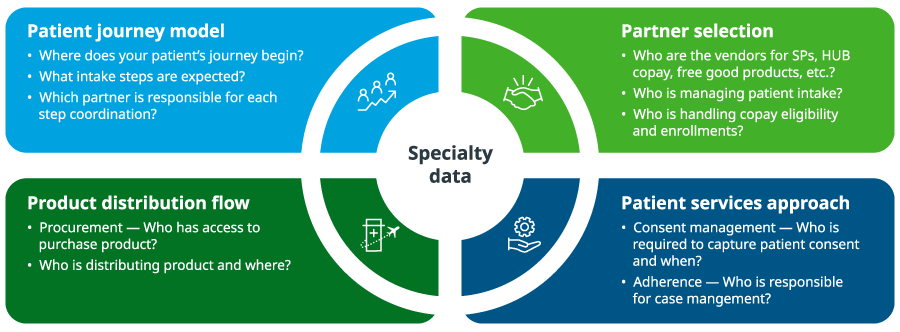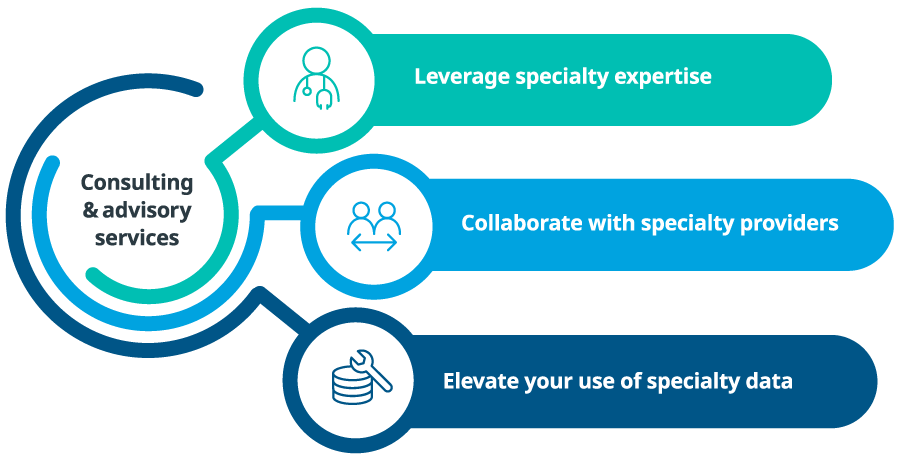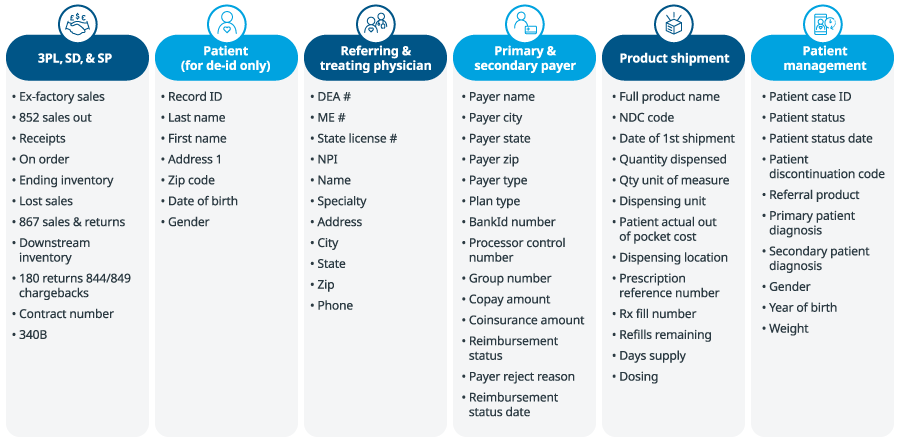Across the board, the pharmaceutical industry has witnessed significant growth in the availability of patient data across the healthcare continuum, including data from labs, electronic medical records, medical claims, pharmacy claims, patient assistance information, alternative sites of care, large health systems, and digital apps. The specialty data landscape is no exception.
You and your data partner play a vital role throughout a patient's therapeutic journey; quality data at the non-identified patient level is critical to understanding patient engagement and to support adherence. For patients taking specialty therapeutics, correct use and adherence is key.
When thinking about the types of data you require, start early, prior to launch, and make decisions about the data that will help meet your key metrics. Working with a data aggregator and consulting team with subject matter expertise and experience will set you up for success.
It’s a bit like a couple working with a wedding planner to plan their dream wedding. They know they want to create a successful big day when all the details fall into place, but they don’t know how to find the resources to make their dream happen. A quality data contractor (or wedding planner) will develop a strategy, identify the best available data, and ask the right questions to formulate a successful roadmap and wedding day.
Developing a data strategy
Designing a specialty data strategy, like planning a wedding, is overwhelming — and many stakeholders are involved who have varying needs and metrics. Understanding each key stakeholder group’s particular wants will help you drive continuity in the data strategy.
IQVIA will help shape a manufacturer’s data strategy by asking the right questions, getting the right people involved, guiding them to the right datasets, and integrating its own proprietary claims-level data, giving them one-stop-shopping data integration.
Considerations for driving a strong data strategy approach

Why is a data strategy so important?
The healthcare channel provides a wealth of both structured and unstructured data to measure the patient journey. Identifying the right rich sources of patient data will help support your patients’ needs. Accurate data lets you engage patients throughout the stages of the journey, and help when circumstances change:
- Develop a data aggregation road map that supports product launch objectives and timelines
- Evaluate data partner services and establish key metrics to monitor performance
- Guide contract process and identify critical data elements to support patient journey insights
- Determine unique reporting requirements for home office and/or field personnel
- Educate stakeholders on how data availability will affect key metric reliability
Benefits of a strong data strategy

The power of value-centric data strategy and consulting partnership
Confidence in the data and validation of the data are crucial to gaining visibility into the patient journey. That’s why a data aggregation service provider — much like a wedding planner — who becomes a true partner to your organization is so important.
On the other hand, poor data quality can have serious impacts — which are avoidable with a strong data aggregator partner. A few include:
- Inability to quickly recognize market conditions and activate home office and field-based teams
- Inability to enforce performance-based contracts with pharmacies and other channel partners
- Inability to convince business stakeholders that the cost of data services is valuable
- Inability to accurately forecast brand demand
How can a data aggregator help your business?
Experienced aggregators offer recommendations for all areas of your data model, data strategy, and program needs:
Leverage specialty expertise: Get recommendations for patient journey model, partner selection, and distribution model. Improve your program with subject matter expertise from multiple distribution models, specialty partners, and therapeutic areas.
Collaborate with specialty providers: Gain best-of-breed data exhibits across different specialty partners (e.g., 3PL, SD, SPP, Hub, Copay, PAP, and ITP). Receive recommendations, measurements, and reporting on specialty partner data quality and performance. Participate in partner-facilitated SP data agreement redline reviews and status code mapping discussions.
Elevate the use of specialty data: Inform participants on patient tokenization process and industry standards for consent management. Make connections between timing of data availability, source derivation, and business use cases.
A trusted data aggregator becomes an extension of your business

Key components of a specialty data aggregator contract
Having clear, specific language in the contract allows the specialty data aggregator to understand your expectations and how the aggregator will be measuring them. Elements to consider for a specialty data contract include:
- Confirmed use of the data aggregator (e.g., file types, periodicity and timing of delivery, file transmission connections and naming conventions including restatement, and tokenization engine and data center)
- Data layouts of each file type that includes data requirements, valid values and field lengths, and business rules related to data content (unique records, duplicate checks, etc.)
- SLA requirements, such as scorecards of timeliness, accuracy and completeness, guidelines for error resolution, and calculation of fees
- KPIs including patient intake business rules, case management, and adherences services
Contract negotiations of any kind can be lengthy and messy, but in the case of specialty pharma, it is especially important to ensure all critical data elements, requirements, essential values, and unique business rules are correctly captured prior to signature.
Depending on the nuances of your patient journey or data flow model, you may need to capture certain data points at a certain time, from a certain entity, to support the business. IQVIA customizes the data layouts for your specific data providers, in a manner that is scalable and flexible.
Example of a comprehensive and flexible data layout

The data aggregator can help you secure clear, effective, and valuable contracts with your specialty data providers and other trade partners.
Strong contracts = strong data = strong insights
Just like a wedding planner seamlessly transforms the couple’s disparate ideas into one beautiful day — all while keeping the family stakeholders happy — a data aggregator seamlessly transforms your patient data into actionable business intelligence.
IQVIA has deep experience helping pharma manufacturers navigate their data strategy and achieve their goals.

Specialty Data Strategy and Consulting Services
Discover ways to set up your organization up for success whether you are launching your first product, a new product, or looking to expand your current data capabilities to include tokenization and integration capabilities beyond your current services model.















